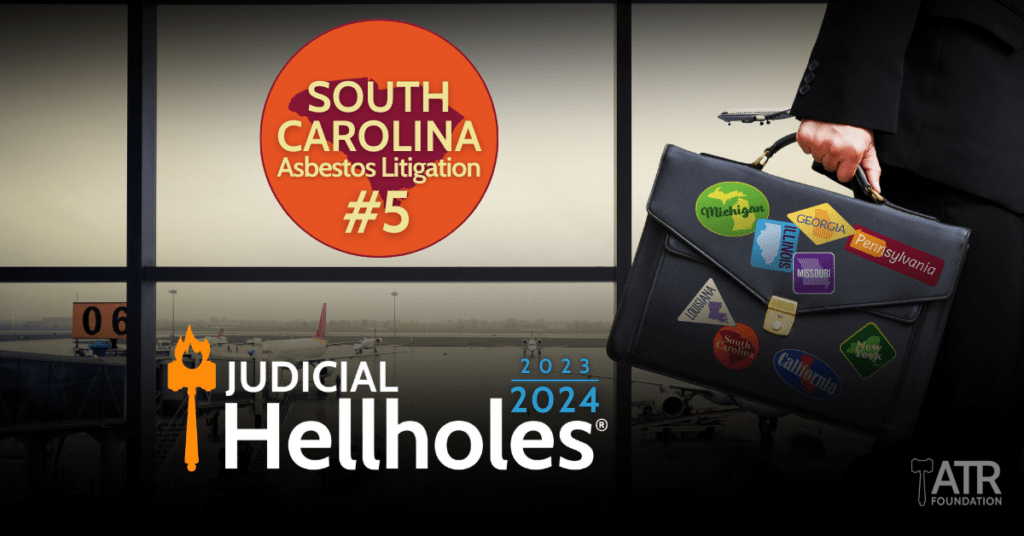‘Highly Unusual’ Rehearing of Louisiana Case Raises Judicial Independence Concerns
Louisiana Supreme Court Waffles Under Political Pressure, ATRA Brief Urges Court to Stand Strong

Judicial Hellholes® Report Highlights Asbestos Litigation Challenges
South Carolina finds itself in the spotlight as the American Tort Reform Foundation designates its asbestos litigation environment as the fifth-worst Judicial Hellhole® in its annual report.
The ranking underscores ongoing concerns surrounding South Carolina’s asbestos docket since it landed it on the Judicial Hellholes® list in 2020.
ATRF says asbestos litigation in the Palmetto State is marred by biases against corporate defendants, unwarranted sanctions, low evidentiary requirements, a tendency to modify jury verdicts to favor plaintiffs, unfair trials, and the imposition of severe verdicts. In 2017, retired South Carolina Supreme Court Chief Justice Jean Hoefer Toal was appointed to oversee the state’s asbestos docket, and has been at the helm of many of these controversies.
“South Carolina’s asbestos docket has become a hotspot for claims, raising serious questions about the fairness and reliability of the legal process,” Tiger Joyce, president of the American Tort Reform Association said.
The South Carolina Supreme Court has a crucial role in addressing these issues. Pending asbestos cases, such as Edwards v. Scapa Waycross, Inc. and Jolly v. General Electric Co., provide the court with an opportunity to restore balance to the state’s asbestos jurisprudence.
Lawsuit abuse and excessive tort costs in South Carolina result in a significant economic toll. Data reveals that South Carolinians pay an annual $738 “tort tax,” with nearly 36,000 jobs lost each year due to these excessive tort costs.
“The abuse within South Carolina’s asbestos litigation system is a betrayal of justice, where opportunistic legal practices take precedence over fairness,” Joyce said. “Local businesses, many unrelated to asbestos exposure, suffer economic consequences, leading to job losses and closures.”
South Carolina also is seeing more high-dollar, “nuclear” verdicts in its asbestos cases, including a $29.1 million verdict against Whittaker Clark & Daniels. Nuclear verdicts are those that exceed $10 million. The company was forced to file bankruptcy after the verdict and
Judge Toal appointed a receiver to “take over its operations.”
“The erosion of trust in the legal system is palpable,” Joyce said. “Manipulating the system for financial gain sends a damaging message, compromising citizens’ trust in the fairness and integrity of the legal process.”
South Carolina’s No. 5 ranking in the Judicial Hellholes® report due to asbestos litigation should serve as a wake-up call. Reform is crucial not only for protecting businesses but also for restoring faith in the legal system and ensuring justice for those genuinely impacted.
To learn more about the problems surrounding asbestos litigation in South Carolina, visit JudicialHellholes.org and read the comprehensive report.
Louisiana Supreme Court Waffles Under Political Pressure, ATRA Brief Urges Court to Stand Strong
Left unchecked, these jurisdictions will continue dragging down economic growth and undermining justice through rampant lawsuit abuse.
Claimants Given Opportunity to Vote on Plan; Judge to Reconsider Scientific Validity of Plaintiffs’ Experts
Legitimate consumer protection demands sound science and impartial analysis — not distorted data designed to manufacture lawsuits.
Law Firms Spent $168M+ on 2.2M Ads in Georgia
ATRA’s Latest Studies Reveal Financial Influence and Lack of Transparency in Pennsylvania’s Campaign Finance Systems